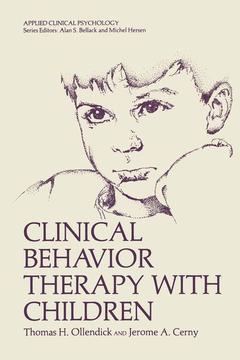Description
Clinical Behavior Therapy with Children, 1981
NATO Science Series B: Series
Authors: Ollendick Thomas H., Cerny Jerome A.
Language: English
Subjects for Clinical Behavior Therapy with Children:
Keywords
Biofeedback; Prompting; Training; age; assessment; behavior; child; children; development; learning theory; management; research; social learning; therapy; treatment
105.49 €
In Print (Delivery period: 15 days).
Add to cart
Publication date: 02-2012
364 p. · 15.2x22.9 cm · Paperback
364 p. · 15.2x22.9 cm · Paperback
Description
/li>Contents
/li>
As noted by its title, the focus of this book is centered on an examination of behavior therapy with children in clinical settings. Throughout, our goal has been to examine theoretical underpinnings, review empirical research, and illustrate clinical utility for a variety of behavioral proce dures with children. In pursuing this goal, we have described child behavior therapy as an approach based on empirical methodology, de rived from behavioral principles, and focused upon adjustment disor ders of children. The hallmark of such an approach is its accountability the extent to which the procedures and techniques presented in this text are demonstrably accountable must be determined at least partially by the reader. As students of child behavior, we have become sensitized to two trends in behavior therapy with children during the preparation of this book. First, we have been concerned with the simple application of behavioral procedures to children, irrespective of developmental con siderations. All too frequently, assessment strategies and treatment pro cedures found to be useful with adults have been applied to children in an indiscriminate fashion. For example, some recent studies have examined and assessed the very same social skill deficits in children as in adults (e. g. , lack of eye contact, delayed latency of response, and absence of positive commendatory responses). Surely, skill deficits differ from age to age just as they differ from situation to situation.
1. Foundations of Behavior Therapy.- Assumptions in Behavior Therapy.- Determinants of Behavior.- Behavior Therapy Models.- Summary.- 2. Behavioral Assessment.- Behavioral Interviews.- Checklists and Rating Forms.- Traditional Standardized Instruments.- Other Instruments.- Behavioral Observation.- Summary.- 3. Systematic Desensitization, Implosion, and Flooding.- Systematic Desensitization.- Implosive Therapy and Flooding.- Summary.- 4. Modeling and Social Skills Training.- Modeling.- Social Skills Training.- Summary.- 5. Basic Operant Procedures.- Shaping.- Chaining.- Discrimination, Stimulus Control, and Fading….- Prompting.- Summary.- 6. Other Operant Procedures.- Contingency Contracting.- Token Economy Programs.- Biofeedback Training.- Summary.- 7. Operant Reductive Procedures.- Extinction.- Differential Reinforcement.- Response Cost.- Timeout.- Overcorrection.- Physical Punishment.- Summary.- Chapters 7. Cognitive Procedures and Self-Management.- Cognitive Behavior Therapy.- Self-Management.- Summary.- 9. Parent Training Programs.- Models of Parent Training.- Characteristics of Clinic-Referred Children and Their Families.- Family Characteristics and Parent Training Outcome.- Parent Training Formats.- Content Issues in Parent Training.- Parent Training Procedures.- Cost Effectiveness of Parent Training.- Clinical Applications.- New Developments.- Summary.- 10. Integrative Issues.- Comprehensive Behavioral Programs.- Maintenance and Generalization.- Preventive Efforts.- Ethical Considerations.- Summary.
© 2024 LAVOISIER S.A.S.




